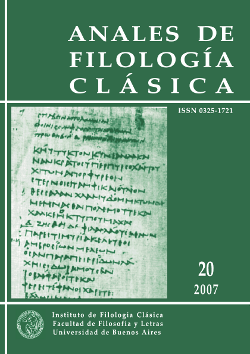La reflexión gramatical en la época tardoantigua.
Palabras clave:
antigüedad tardía, reflexión gramatical, grammaticus, lengua como agente social, construcción de la identidad cultural, late antiquity, grammatical reflection, language as a social agent, construction of cultural identity
Resumen
El tardoantiguo (III d. C. VIII d. C.) se caracteriza por la fuerte pervivencia de ciertos rasgos de la Antigüedad Clásica, transformados ante la aparición de nuevas ideologías. Es también típica de la época la reflexión metalingüística, realizada fundamentalmente a través de la escuela y del grammaticus, quien otorgaba a sus estudiantes las claves culturales necesarias para integrar la clase dirigente. Este trabajo analiza qué lugar ocupó dicha reflexión a partir de testimonios gramaticales de la época, y de qué manera funcionaba la lengua como agente de cohesión e inserción social en la reconstrucción y reafirmación de la identidad cultural.The late antique period (III A. D. VIII A. D.) is caracterised by the strong pervivence of certain characteristics form classical antiquity, transformed due to the appearance of new ideologies. The reflection on language was also a typical element, and it was carried on by the school and the grammaticus, who gave his students the cultural elements to fit in the leading class. This paper studies the place taken by reflection on language, and the role of language as a social agent on the reconstruction and reaffirmation of cultural identity.Descargas
La descarga de datos todavía no está disponible.
Cómo citar
Pégolo, L., & Cardigni, J. (1). La reflexión gramatical en la época tardoantigua. Anales De Filología Clásica, (20), 145-157. https://doi.org/10.34096/afc.v0i20.433
Número
Sección
Artículos
Los autores/as que publiquen en esta revista aceptan las siguientes condiciones:
- Los autores/as conservan los derechos de autor y ceden a la revista el derecho de la primera publicación, con el trabajo registrado con la licencia de Atribución-CompartirIgual 4.0 Internacional (CC-BY-SA 4.0) de Creative Commons, que permite el uso comercial de la obra y de las posibles obras derivadas, la distribución de las cuales se debe hacer con una licencia igual a la que regula la obra original.
- Los autores/as pueden realizar otros acuerdos contractuales independientes y adicionales para la distribución no exclusiva de la versión del artículo publicado en esta revista (p. ej., incluirlo en un repositorio institucional o publicarlo en un libro) siempre que indiquen claramente que el trabajo se publicó por primera vez en esta revista.
- Se permite y recomienda a los autores/as a publicar su trabajo en Internet (por ejemplo en páginas institucionales o personales) antes y durante el proceso de revisión y publicación, ya que puede conducir a intercambios productivos y a una mayor y más rápida difusión del trabajo publicado (vea The Effect of Open Access).
En ningún momento se cobrará monto alguno al autor por la publicación en esta revista.







